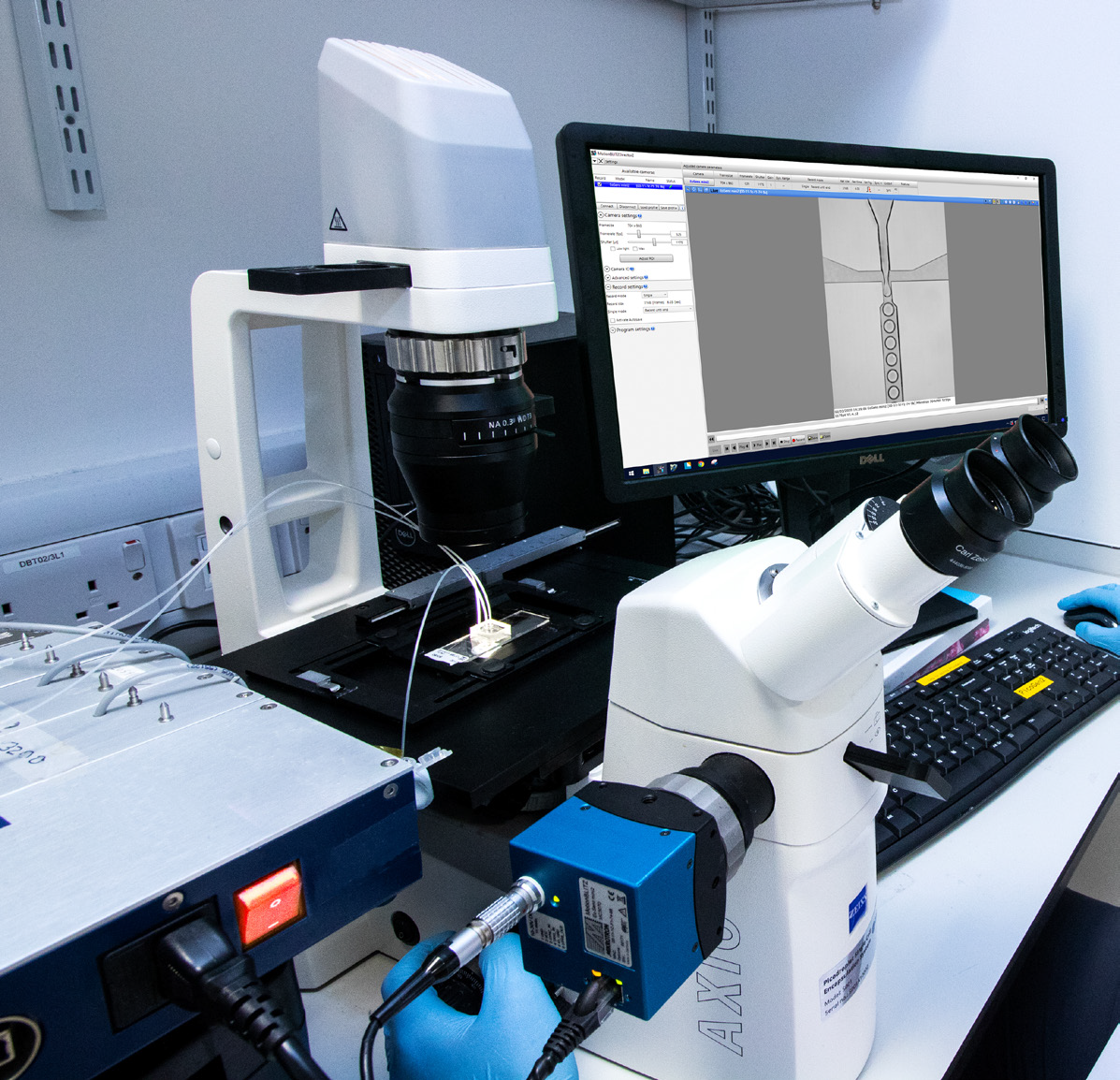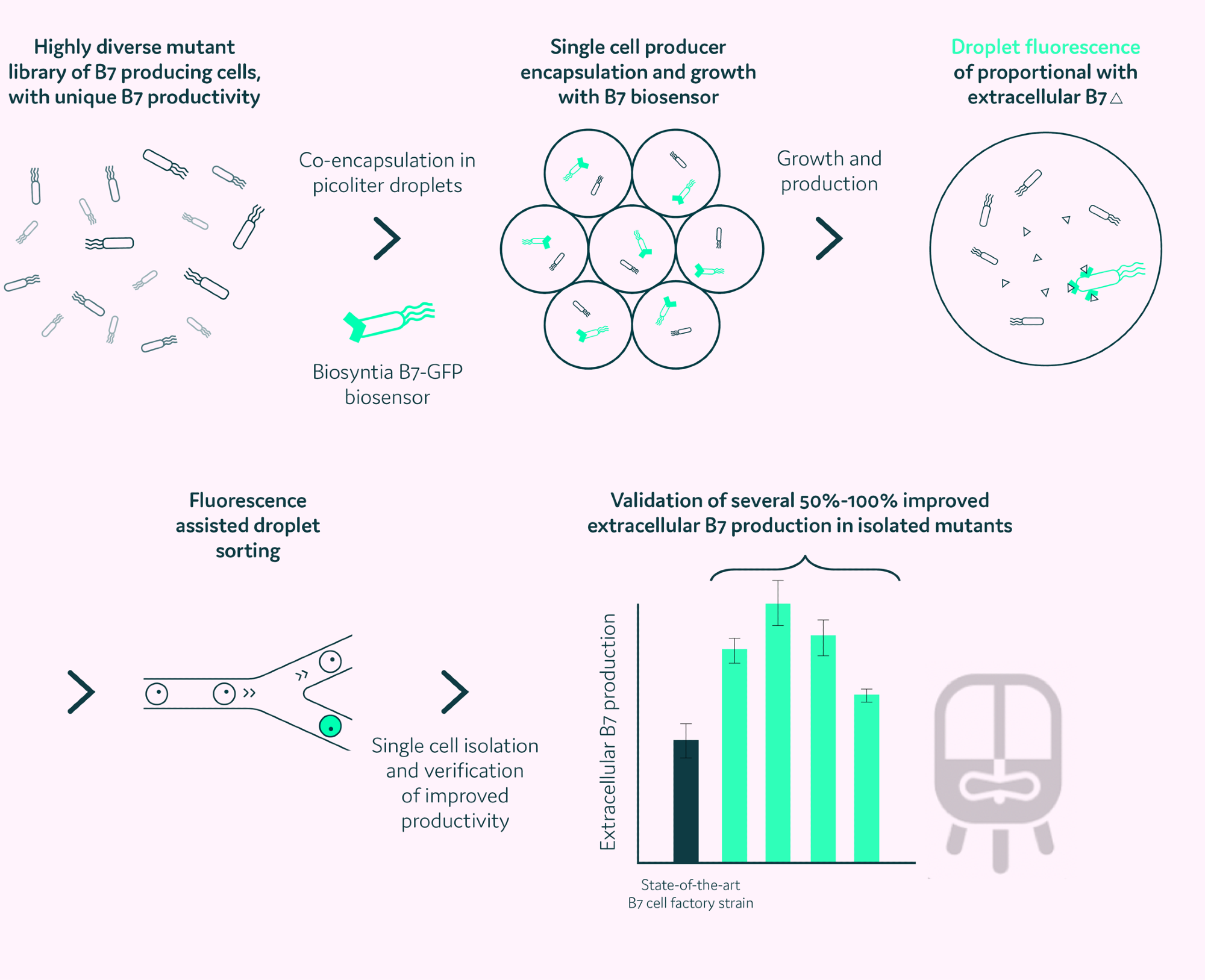With a focus on developing natural and sustainable processes in the production of consumer products, Biosynthia is an industrial biotech company that makes vitamins, antioxidants, and other products used in beauty and nutrition.
To reach its objective of using more sustainable nutritional ingredients, Biosynthia is investing in ultra-high-throughput technology using a new platform.
By integrating Fluidic Sciences and Sphere Bio’ Pico-Mine® platform, Biosyntia is now exploring genetic diversity at unprecedented speed, identifying the one in a million cells from large mutant libraries that show improved production phenotypes.
Transitioning to picodroplet-based technologies
Ultra-high-throughput droplet-based screening had long been on Biosyntia’s radar for its immense potential in cell factory development and Biosyntia’s synergistic expertise in biosensor development.
Having explored various companies over several years to help bring Biosyntia’s technology in-house, a partnership was born with Fluidic Sciences and Sphere Bio, with their groundbreaking platform Pico-Mine®
The Pico-Mine® is particularly effective during early-stage research using picodroplet technology, and provides:
- Semi-automated platform capabilities
- Flexible workflows and assays to find biological variants among large cell populations.
- Increased throughput
- Reduced financial cost across applications
One of Biosyntia’s unique technologies for developing state-of-the-art cell factories for precision fermentation is the use of genetically encoded biosensors. However, existing techniques are unable to reach the precision desired for products.
Specifically, traditional tools, including flow cytometry, have been the most common tools to sense internal cell product concentrations but are unable to reach the nano-liter scale picodroplet technology can achieve.
In contrast, Pico-Mine® droplet-based screening allows for product identification on the nanoscale during the fermentation process with direct sensing of extracellular product concentrations. Additionally, the Pico-Mine® platform allows easy single-cell isolation of improved producing strains.
Droplet screening is a game-changer and with Pico-Mine® from Fluidic Sciences and Sphere Bio in our lab, we are now able to test 1000-foldmore strains within the same timeframe and with a fraction of the resources. We are already seeing super exciting results and expect many more to come.
David Lennox-Hvenekilde, Sr. Scientist and Droplet Screening Lead, Biosyntia

Image Credit: Fluidic Sciences and Sphere Bio
Within the first few months of using the Pico-Mine® platform, Biosynthia’s workflow has already seen significant improvement, allowing for the identification of improved genetic variants of the Biosynthia’s B7 production strain. In turn, this has allowed the process to be upscaled for precision fermentation of sustainable and natural B7 vitamin (Bio-B7).
By integrating Pico-Mine®, Biosyntia is exploring genetic diversity at unprecedented speed, identifying the one in a million cells from large mutant libraries that show improved production phenotypes.
Pico-Mine® has been specifically designed to ensure ease of use, allowing researchers with no microfluid experience to run experiments within weeks. This means that it is also possible for researchers to quickly integrate the system into existing projects.
The semi-automated design of the platform also allows researchers to expand into new research areas and stay at the forefront of effective single-cell research and implementation.
Pico-Mine® is also allowing Biosyntia to develop novel industrially relevant cell factories. The next steps are to scale this technology to a wide array of further molecules, not limited to B-vitamins.
Moving forward, droplet-based ultra-high-throughput screening is expected to be a cornerstone in Biosyntia’s R&D strategy in reaching their goals of European bio-based production of greener and more sustainable nutritional ingredients.

Figure 1. Biosyntia’s updated workflow integrating Pico-Mine® with their proprietary B7 biosensor has enabled them to rapidly identify improved genetic variants of their already world-leading B7 production strain. Image Credit: Fluidic Sciences and Sphere Bio
We are truly excited about having the droplet technology inhouse to substantially accelerate the improvement of strains for precision fermentation of nutritional ingredients. From what I have already seen, I expect to see significant impact across a wider portfolio of projects.
Hans Genee, CSO and Co-Founder, Biosyntia
About Fluidic Sciences and Sphere Bio
Fluidic Sciences develops transformative in‑solution technologies for protein interaction analysis. Its flagship Fluidity One‑M instrument leverages Microfluidic Diffusional Sizing (MDS) to measure binding affinity, stoichiometry, size, and concentration without immobilization - directly in complex backgrounds such as serum, plasma, and lysate.
Sphere Bio is a brand of Fluidic Sciences. Its technology develops and manufactures single‑cell analysis and monoclonality assurance systems that enable researchers to find, analyze, and isolate the most valuable cells with speed and precision. Its proprietary picodroplet microfluidics and Cyto‑Mine® Chroma multiplexing platform power applications across antibody discovery, cell line development, cell engineering, and cell therapy.
Sponsored Content Policy: News-Medical.net publishes articles and related content that may be derived from sources where we have existing commercial relationships, provided such content adds value to the core editorial ethos of News-Medical.Net which is to educate and inform site visitors interested in medical research, science, medical devices and treatments.